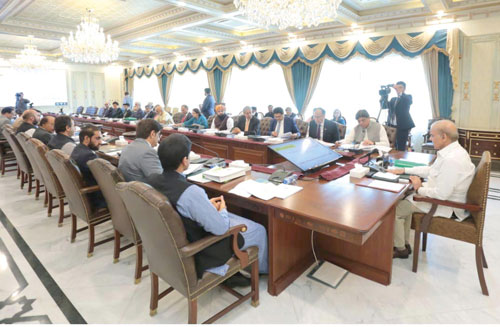NEC meets to approve budget 2022-23 targets
The National Economic Council on Wednesday agreed on the closure of markets by 8:30pm in all provinces, a day after the federal Cabinet contemplated the move to maximise the use of daylight as part of the government’s austerity measures to deal with the energy crisis.
Prime Minister Shehbaz Sharif chaired the meeting, which was attended by the chief ministers of Sindh, Punjab and Balochistan. Khyber Pakhtunkhwa Chief Minister Mahmood Khan did not attend the meeting. Chief Secretary Shehzad Bangash represented the province instead.
The chief ministers of all provinces agreed to the decisions of the federal cabinet at the NEC meeting. The participants were apprised of the recommendations and the decisions reached during the high-level meeting held on June 7.
On the occasion, the chief ministers of Sindh, Punjab and Balochistan sought two days’ time to carry out consultation with the trade and business organisations in the respective provinces on the subject.
According to a statement issued in this regard, the chief ministers appreciated the steps taken by the federal government to deal with the energy crisis and the four provinces agreed on the proposal of markets’ closure at 8.30pm. The chief ministers also backed the decisions of the federal cabinet on nationwide measures to deal with the energy crisis and assured their full cooperation in tackling it.
On the other hand, KP Finance Minister Taimur Khan Jhagra said on Twitter that the province had not agreed to close down markets. “KP has not agreed to this. It was put forward that KP will decide after consultation with the CM,” he said. Power Minister Khurrum Dastagir, addressing a press conference, said that the early closure of markets and work-from-home arrangements can save electricity. “The electricity being produced in the country is 22,000 MW and the requirement is 26,000 MW,” said the minister, adding that the energy shortfall in the country is 4,000 MW. He also said that the industrial sector was being provided with power uninterruptedly and that 1,100 MW will be added to the national grid once the K-2 Nuclear Power Plant starts production. Meanwhile, the National Economic Council met to approve the national development outlay of Rs2.184 trillion and growth and revenue targets set by the government for the next fiscal year 2022-23. The growth rate for the next fiscal year has been set at 5%, lower than that of the ongoing year of 6%. While the growth in the current fiscal year has been attributed to rising imports, the target set for the next year indicates that the economy would contract and inflation my rise. This growth rate estimated by the government is still lower than World Bank projection of 4%, according to the ‘Global Economic Prospects’ report released on Tuesday. The government has set the inflation target at 11%, slightly higher than the 10.5% inflation estimated for the ongoing fiscal year.
The government is setting an ambitious target for tax collections at Rs7.255 trillion. This comes after the tax collection in the current years grew by 6.1% to an estimated Rs5.83 trillion, according to Pakistan Institute of Development Economics. The government intends to allocate Rs578 billion for subsidies and Rs530b for pensions. In the total development outlay of Rs2.184 trillion, the federal share will be Rs800 billion through Public Sector Development. The Gross Domestic Product is estimated at Rs78 trillion, around 16.5% higher than Rs66.95 trillion in the current fiscal year. The budget deficit has been estimated at Rs4.282 trillion which would be covered by external loans.










